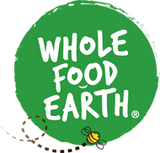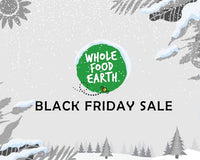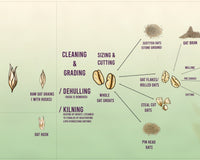You’ve probably already heard of the term ‘plant-based diet’, as it has taken the world by storm in recent years. Now, more than ever before, people are starting to move away from consuming meat and adopting a more plant-rich diet. What was once something that may have been considered a ‘niche’ or a ‘trend’, has now become a popular lifestyle choice.
Due to its increase in popularity and demand, you can now find a plant-based version of pretty much any food or drink your heart desires. If you go to your local supermarket they’ll generally be a wide variety of plant-based products available, and often a dedicated section. Restaurants, public events and even many fast food chains now have plant-based options on their menus.
However, deciding to switch over to a plant-based diet, or just incorporating more of it into your lifestyle can be difficult to navigate. But here at Wholefood Earth, we’re here to give you a helping hand. So, if you want to know more about the plant-based diet, along with how transitioning can be beneficial for the environment and your health - then carry on reading!
What is a Plant-Based Diet?
A plant-based diet for beginners can be a great place to start if you’ve been considering eating less meat and are wanting to include more fruit, vegetables, and wholefoods into your diet.
Many people use the term “plant-based” to illustrate that they eat a diet that either entirely or mostly comprises of plant foods. Although, there are some people on a plant-based diet that may still eat certain animal-derived products. Being plant-based doesn’t mean that you are vegetarian or vegan and therefore do not eat any meat or dairy. Instead, it is more about choosing to source a higher proportion of your foods from plant sources.
Other people may use the phrase “whole foods, plant-based” to describe their diet, which differs slightly from the standard term, by generally only eating plant foods which are raw, or minimally processed.
Differences Between Plant-Based and Vegan
Some people choose to label themselves as 'plant-based,' while others use the term 'vegan' to describe their lifestyle. It may leave you wondering what exactly the differences are. Although there are a few definitions, most people tend to agree with a few specific variations between the two.
A vegan diet excludes all animal-derived foods, such as eggs, meat, fish, poultry, cheese, and other dairy products. Instead, a vegan diet includes plant foods like fruits, vegetables, grains, nuts, seeds, and legumes, whilst not necessarily cutting out processed foods from their diets.
Over time, veganism has grown into a movement based not just on ethics and animal welfare, but also environmental and health concerns. Most vegans will try as much as possible, to exclude all forms of animal exploitation and cruelty, not only from their diet, but from their lifestyle too.
On the other hand, plant-based diets generally cut out processed foods and focus on plant-based whole foods, whilst still having the option of eating some animal products. If you choose to be on a whole foods, plant-based diet, this normally means avoiding oils and processed grains, whereas on a vegan or standard plant-based diet, these foods may still be consumed.
There is also the potential that some people may start out as one and adopt the intentions or ideas of the other approach. Meaning it is also possible to be both plant-based and vegan at the same time.
Benefits of Going Plant-Based
A lot of consumers are now starting to recognise that reducing meat consumption can offer not just individual health benefits, but also advocacy for animal welfare, and sustainability for our planet.
Adopting a plant-based diet can be beneficial if you want to lead a healthier lifestyle or are looking to lose weight. Studies have shown that those on a plant-based diet tend to have a lower BMI and are less at risk of heart disease or developing chronic health conditions.
Decreasing your intake of animal products may also reduce inflammation, improve your digestion, and lower your levels of ‘bad’ cholesterol. Plants have vital nutrients that you cannot find in other food sources. The vitamins, minerals, and antioxidants present in plants help in keeping your cells and bod healthy, so that your immune system can function at its finest.
Eliminating or reducing animal products from our diet and switching to a plant-based diet can also be favourable for our surroundings. People may choose to avoid animal products in an attempt to limit their environmental impact and aid in reducing greenhouse gas emissions, as well as their carbon footprint.






